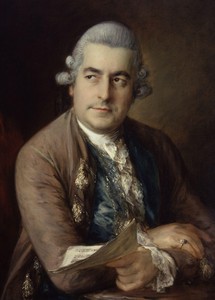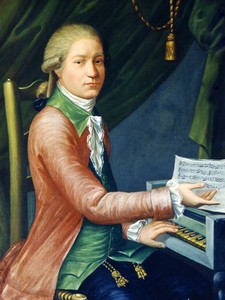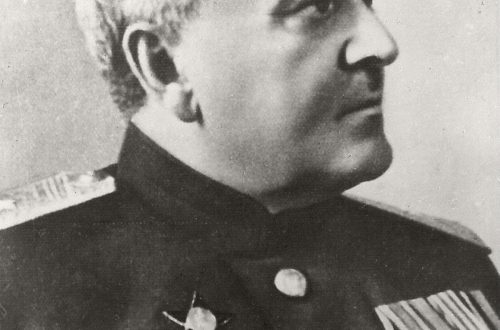
Johann Christian Bach |
Johann Christian Bach
Johann Christian Bach, among other merits, nurtured and cultivated a flower of grace and grace on classical soil. F. Rohlic

“The most gallant of all the sons of Sebastian” (G. Abert), the ruler of the thoughts of musical Europe, a fashionable teacher, the most popular composer, who can compete with fame with any of his contemporaries. Such an enviable fate befell the youngest of J.S. Bach’s sons, Johann Christian, who went down in history under the name of “Milanese” or “London” Bach. Only the young years of Johann Christian were spent in Germany: up to 15 years in the parental home, and then under the tutelage of Philip Emanuel’s older half-brother – the “Berlin” Bach – in Potsdam at the court of Frederick the Great. In 1754, the young man, the first and only of the whole family, leaves his homeland forever. His path lies in Italy, continuing in the XVIII century. be the musical mecca of Europe. Behind the young musician’s success in Berlin as a harpsichordist, as well as a little composing experience, which he improved already in Bologna, with the famous Padre Martini. Fortune from the very beginning smiled at Johann Christian, which was greatly facilitated by his adoption of Catholicism. Letters of recommendation from Naples, then from Milan, as well as the reputation of a student of Padre Martini, opened the doors of the Milan Cathedral for Johann Christian, where he took the place of one of the organists. But the career of a church musician, which was his father and brothers, did not at all attract the youngest of the Bachs. Very soon, a new opera composer declared himself, rapidly conquering the leading theatrical stages in Italy: his opuses were staged in Turin, Naples, Milan, Parma, Perugia, and by the end of the 60s. and at home, in Braunschweig. The fame of Johann Christian reached Vienna and London, and in May 1762 he asked the church authorities for leave to fulfill an opera order from the London Royal Theatre.
A new period began in the life of the maestro, who was destined to become the second in the famous triad of German musicians who made the glory of … English music: the successor of G. F. Handel, Johann Christian, was almost 3 decades ahead of the appearance on the shores of Albion I. Haydn … It would not be an exaggeration to consider 1762-82 in the musical life of the English capital during the time of Johann Christian, who rightfully won the nickname “London” Bach.
The intensity of his composing and artistic activity, even by the standards of the XVIII century. was huge. Energetic and purposeful – this is how he looks at us from the wonderful portrait of his friend T. Gainsborough (1776), commissioned by Padre Martini, he managed to cover almost all possible forms of the musical life of the era.
First, the theatre. Both the Royal Courtyard, where the “Italian” opuses of the maestro were staged, and the Royal Covent Garden, where in 1765 the premiere of the traditional English ballad opera The Mill Maiden took place, which brought him special popularity. Melodies from “The Servant” were sung by the widest audience. No less successful were the Italian arias, published and circulated separately, as well as the songs themselves, collected in 3 collections.
The second most important area of activity of Johann Christian was playing music and teaching in the circle of music-loving aristocrats, especially his patroness Queen Charlotte (by the way, a native of Germany). I also had to perform with sacred music, performed according to the English tradition in the theater during Lent. Here are the oratorios by N. Iommelli, G. Pergolesi, as well as his own compositions, which the composer began to write in Italy (Requiem, Short Mass, etc.). It must be admitted that the spiritual genres were of little interest and not very successful (even cases of failures are known) to the “London” Bach, who devoted himself entirely to secular music. To the greatest extent, this manifested itself in perhaps the most important field of the maestro – the “Bach-Abel concertos”, which he established on a commercial basis with his adolescent friend, composer and gambo player, a former student of Johann Sebastian C. F. Abel. Founded in 1764, the Bach-Abel Concertos set the tone for the London music world for a long time. Premieres, benefit performances, demonstrations of new instruments (for example, thanks to Johann Christian, the piano made its debut as a solo instrument in London for the first time) – all this became an integral feature of the Bach-Abel enterprise, which gave up to 15 concerts a season. The basis of the repertoire was the works of the organizers themselves: cantatas, symphonies, overtures, concertos, numerous chamber compositions. Here one could hear Haydn’s symphonies, get acquainted with the soloists of the famous Mannheim Chapel.
In turn, the works of the “English” were widely circulated in Europe. Already in the 60s. they were performed in Paris. European music lovers sought to get Johann Christian not only as a composer, but also as a bandmaster. Particular success awaited him in Mannheim, for which a number of compositions were written (including 6 quintets op. 11 for flute, oboe, violin, viola and basso continuo, dedicated to the famous music connoisseur Elector Karl Theodor). Johann Christian even moved to Mannheim for a while, where his operas Themistocles (1772) and Lucius Sulla (1774) were successfully performed.
Relying on his fame in French circles as an instrumental composer, he writes specifically for Paris (commissioned by the Royal Academy of Music) the opera Amadis of Gaul, first performed before Marie Antoinette in 1779. Although performed in the French way – with traditional divertissement at the end each act – the opera was not a success, which marked the beginning of a general decline in the creative and artistic activity of the maestro. His name continues to appear in the repertory lists of the royal theater, but the failed Amadis was destined to become Johann Christian’s last operatic opus. Gradually, interest in the “Bach-Abel Concertos” also fades away. Court intrigues that rejected Johann Christian for secondary roles, deteriorating health, debts led to the premature death of the composer, who only briefly survived his faded glory. The English public, greedy for novelty, immediately forgot it.
For a relatively short life, the “London” Bach created a huge number of compositions, expressing the spirit of his time with extraordinary completeness. The spirit of the epoch r about to about to about. His expressions to the great father “alte Perucke” (lit. – “old wig”) are known. In these words, there is not so much a disregard for an age-old family tradition as a sign of a sharp turn towards the new, in which Johann Christian went much further than his brothers. A remark in one of W. A. Mozart’s letters is characteristic: “I am just now collecting Bach’s fugues. “Like Sebastian, so did Emanuel and Friedemann” (1782), who thus did not separate his father from his older sons when studying the old style. And Mozart had a completely different feeling for his London idol (acquaintance took place in 1764 during Mozart’s tour in London), which for him was the center of all the most advanced in the art of music.
A significant part of the heritage of the “London” Bach is made up of operas mainly in the seria genre, which experienced at the turn of the 60-70s. XVIII century in the works of J. Sarti, P. Guglielmi, N. Piccinni and other representatives of the so-called. neo-Neapolitan school second youth. An important role in this process belongs to Johann Christian, who began his operatic career in Naples and actually led the aforementioned direction.
Inflamed in the 70s. In the famous war between the “glukkists and the picchinnists”, the “London” Bach was most likely on the side of the latter. It was not for nothing that he, without hesitation, offered his own version of Gluck’s Orpheus, supplying, in collaboration with Guglielmi, this first reformist opera with inserted (!) numbers, so that it acquired the scale necessary for evening entertainment. “Novelty” successfully held out in London for several seasons (1769-73), then exported by Bach to Naples (1774).
The operas of Johann Christian himself, tailored according to the well-known scheme of the “concert in costumes”, have been in existence since the middle of the XNUMXth century. libretto of the Metastasian type, outwardly not much different from dozens of other opuses of this kind. This is the smallest creation of a composer-playwright. Their strength lies elsewhere: in melodic generosity, perfection of form, “the richness of harmony, the skillful fabric of parts, the new happy use of wind instruments” (C. Burney).
Bach’s instrumental work is marked by an extraordinary variety. The wide popularity of his writings, which were distributed in lists (as they said then to “fun lovers”, from ordinary citizens to members of the royal academies), contradictory attribution (Johann Christian had at least 3 variants of his surname: in addition to German. Bach, Italian. Bakki, English . Bakk) do not allow to fully take into account everything that was created by the composer, who covered almost all contemporary instrumental genres.
In his orchestral works – overtures and symphonies – Johann Christian stood on the pre-classicist positions both in the construction of the whole (according to the traditional “Neapolitan” scheme, quickly – slowly – quickly), and in the orchestral solution, usually depending on the place and nature of the music. In this he differed both from the Mannheimers and from the early Haydn, with their striving for the crystallization of both the cycle and the compositions. However, there was much in common: as a rule, the extreme parts of the “London” Bach wrote, respectively, in the form of sonata allegro and in “the favorite form of the gallant era – rondo” (Abert). The most significant contribution of Johann Christian to the development of the concerto appears in his work in several varieties. It is a concert symphony for several solo instruments and an orchestra, a cross between a baroque concerto grosso and a solo concerto of mature classicism. The most famous op. 18 for four soloists, attracting melodic richness, virtuosity, freedom of construction. All recitals by Johann Christian, with the exception of early opuses for woodwinds (flute, oboe and bassoon, created during his apprenticeship under Philipp Emanuel at the Potsdam Chapel), were written for the clavier, an instrument that had a truly universal meaning for him. Even in his early youth, Johann Christian showed himself to be a very talented clavier player, which, apparently, deserved the best, in the opinion of the brothers, and to their no small envy, part of the inheritance: 3 harpsichords. A concert musician, a fashionable teacher, he spent most of his life playing his favorite instrument. Numerous miniatures and sonatas have been written for the clavier (including four-handed “lessons” for students and amateurs, captivating with their original freshness and perfection, an abundance of original finds, grace and elegance). No less remarkable is the cycle Six sonatas for harpsichord or “piano-forte” (1765), arranged by Mozart for clavier, two violins and bass. The role of the clavier is also very great in the chamber music of Johann Christian.
The pearl of Johann Christian’s instrumental creativity is his ensemble opuses (quartets, quintets, sextets) with an emphatically virtuoso part of one of the participants. The pinnacle of this genre hierarchy is the Concerto for clavier and orchestra (it was not by chance that Johann Christian in 1763 won the title of the queen’s “master of music” with the clavier concerto). It is to him that the merit belongs to the creation of a new type of clavier concerto with a double exposition in 1 movement.
The death of Johann Christian, not noticed by Londoners, was perceived by Mozart as a huge loss for the musical world. And only centuries later, Mozart’s understanding of the “merits” of his spiritual father became universal. “A flower of grace and grace, the most gallant of Sebastian’s sons took his rightful place in musical history.”
T. Frumkis





